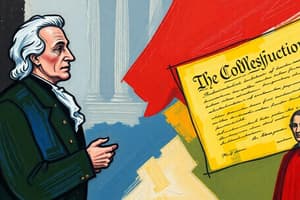Podcast
Questions and Answers
What does the term Amendment refer to?
What does the term Amendment refer to?
- An electoral process for selecting officials
- A section of the Constitution about representation
- A compromise made during the Constitutional Convention
- A change in, or addition to, a constitution or law (correct)
What is Article V of the U.S. Constitution?
What is Article V of the U.S. Constitution?
The section that details how to amend the Constitution.
What is the Great Compromise?
What is the Great Compromise?
A major compromise at the Constitutional Convention that created a two-house legislature.
What does the Electoral College do?
What does the Electoral College do?
What is the Three-Fifths Compromise?
What is the Three-Fifths Compromise?
What are some compromises that occurred at the Constitutional Convention?
What are some compromises that occurred at the Constitutional Convention?
What unresolved matters exist in the Constitution today?
What unresolved matters exist in the Constitution today?
What are some constitutional debates that exist today?
What are some constitutional debates that exist today?
What is the U.S. Constitution (1787)?
What is the U.S. Constitution (1787)?
Flashcards are hidden until you start studying
Study Notes
Key Terms and Definitions
- Amendment: A modification or addition to the Constitution or law.
- Article V: Section in the Constitution outlining the process for amendments, requiring a proposal by Congress or a state convention, and subsequent ratification by three-fourths of the states.
- Great Compromise: Also known as the Connecticut Compromise, it established a bicameral legislature with equal representation in the Senate and proportional representation based on population in the House of Representatives.
- Electoral College: A group of delegates from each state responsible for formal voting to elect the president and vice president.
Compromises at the Constitutional Convention
- Factors leading to the Constitutional Convention included deficiencies in the Articles of Confederation.
- Delegates from 12 out of 13 states negotiated essential compromises for ratification.
- Key compromises included:
- The Great Compromise regarding federal representation.
- The Three-Fifths Compromise, counting enslaved individuals as three-fifths for representation.
- The establishment of the Electoral College mechanism for presidential elections.
Issues Left Unresolved
- Despite securing ratification, compromises resulted in lingering debates:
- The Great Compromise raised questions about Senate representation fairness compared to House representation.
- The Electoral College's impact was evident in the presidential elections of 2000 and 2016, where the winner of the Electoral College did not align with the popular vote, sparking concerns over representation equity.
Ongoing Constitutional Debates
- Current debates echo those from the Constitutional Convention, including:
- The degree of federal government power versus states' rights.
- Protection of individual rights amidst governmental authority, especially highlighted by surveillance issues post-9/11.
- The federal government's role in areas such as public education.
US Constitution (1787)
- Serves as the foundational legal document governing the United States.
- Resulted from compromises between Federalists and Anti-Federalists during the ratification process.
Studying That Suits You
Use AI to generate personalized quizzes and flashcards to suit your learning preferences.




